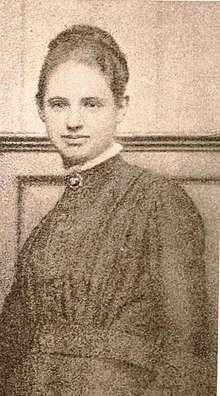Mary Elizabeth Coleridge
Mary Elizabeth Coleridge (23 September 1861 – 25 August 1907) was a British novelist and poet who also wrote essays and reviews.[1] She wrote poetry under the pseudonym Anodos, taken from George MacDonald; other influences on her were Richard Watson Dixon and Christina Rossetti. Robert Bridges, the Poet Laureate, described her poems as 'wonderously beautiful… but mystical rather and enigmatic'.[2]

Mary Coleridge was the daughter of Arthur Duke Coleridge. With the singer Jenny Lind, her father was responsible for the formation of the London Bach Choir in 1875. Other family friends included Robert Browning, Alfred, Lord Tennyson, John Millais and Fanny Kemble. She was the great-grandniece of Samuel Taylor Coleridge and the great niece of Sara Coleridge, the author of Phantasmion.
Coleridge travelled widely throughout her life, although her home was in London, where she lived with her family. She taught at the London Working Women's College for twelve years from 1895 to 1907.
She completed five novels. Her first was The Seven Sleepers of Ephesus, which Chatto & Windus published in February 1893 as by M. E. Coleridge. At least one newspaper noted it as "a new story by Mr M. E. Coleridge".[3] The story is not related to the Seven Sleepers of Ephesus legend; it features a modern Brotherhood which takes that name.[4] Edward Arnold published the other four novels. The best known is The King with Two Faces, which earned her £900 in royalties in 1897.
Coleridge died of complications arising from appendicitis while on holiday in Harrogate in 1907, leaving an unfinished manuscript for her next novel and hundreds of unpublished poems.
Eight of her poems, including "The Blue Bird" (originally published in 1897 under the French title "L'Oiseau Bleu"),[5] were set to music for chorus by Charles Villiers Stanford, and three poems including "Thy Hand in Mine" were set by Frank Bridge. A family friend, the composer Hubert Parry, also set several of her poems as songs for voice and piano. And Cyril Rootham (an erstwhile pupil of Stanford and Parry) set four of her poems for solo voice and orchestra, though when published in 1913 the songs were rewritten for voice and piano.
Coleridge's poetry was first published under her own name in the posthumous Poems (1908). In the preface to this volume, Henry Newbolt wrote:[6]
As a poetess, Mary Coleridge never came before the public under her own name; her printed verse was always either anonymous or signed with the pseudonym ’Άνοδος — a name taken from George Macdonald's romance, "Phantastes," where it is evidently intended to bear the meaning of "Wanderer." Probably several reasons or feelings prompted this concealment; the one by which my own arguments were always met was the fear of tarnishing the name which an ancestor had made illustrious in English poetry [...] I believe that no poems are less likely than these to jar upon lovers of "Christabel" and "The Ancient Mariner."
Published works
- The Seven Sleepers of Ephesus. London: Chatto & Windus, 1893[7]
- Anodos (1900) [1st published by Daniel, Oxford, 1896]. Fancy's Following. Portland, ME: Thomas B Mosher.
- Anodos (1897). Fancy's Guerdon. London: Elkin Mathews.
- The King with Two Faces. London: Edward Arnold, 1897
- Non Sequitur. London: J. Nisbet, 1900 (essays)
- The Fiery Dawn. London: Edward Arnold, 1901
- The Shadow on the Wall: a romance. London: Edward Arnold, 1904
- The Lady on the Drawingroom Floor. London: Edward Arnold, 1906
- Holman Hunt. London: T. C. & E. C. Jack; New York: F. A. Stokes Co., [1908] (three numbers of Masterpieces in Colour issued together: Millais / by A. L. Baldry – Holman Hunt / by M. E. Coleridge – Rossetti / by L. Pissarro.)
- Poems by Mary E. Coleridge. London: Elkin Mathews, 1908
- Songs not listed[8]
- The Collected Poems of Mary Coleridge, ed. Theresa Whistler. London: Rupert Hart-Davis, 1954
- The Lady on the Drawingroom Floor with Selected Poetry and Prose, ed. Heather Braun. Vancouver: Fairleigh Dickinson University Press, 2018.
References
- Mary Elizabeth Coleridge – Poems, Biography, Quotes
- Phillips, Catherine, 'Robert Bridges' Oxford University Press, Oxford 1992 ISBN 0-19-212251-7
- "Books of the Week", The Scotsman, 20 February 1893, p. 2 (no review).
- "New novels", The Academy, p. 302, 8 April 1893
- Anodos (1897). Fancy's Guerdon. London: Elkin Mathews. p. 27.
- Coleridge, Mary E. (1908). Poems. London: Elkin Mathews. pp. v–vi.
- Multiple WorldCat library records report the 1893 publication—evidently, considering all the records, in the publisher's Handy Novels series, as by M. E. Coleridge.
- "Listing of library holdings for Mary Coleridge". Copac. Retrieved 14 June 2009.
External links
| Wikiquote has quotations related to: Mary Elizabeth Coleridge |
| Wikisource has original works written by or about: Mary Elizabeth Coleridge |
- Works by Mary Elizabeth Coleridge at Project Gutenberg
- Works by or about Mary Elizabeth Coleridge at Internet Archive
- Works by Mary Elizabeth Coleridge at LibriVox (public domain audiobooks)

- Free scores of Mary Elizabeth Coleridge's texts in the Choral Public Domain Library (ChoralWiki)
- The Genealogy of the Coleridge Family and Coleridge links at the Wayback Machine (archived 29 October 2009)
- Mary E. Coleridge at Library of Congress Authorities, with 12 catalogue records – including 4 records of recent music publications related to her poetry